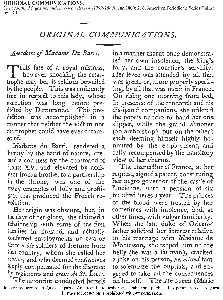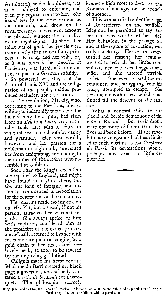 ―401― ―401―
ORIGINAL COMMUNICATIONS.
Anecdotes of Madame Du Barri.
THE fate of a royal mistress,
however shocking the catas-
trophe may be, is seldom bewailed
by the people. This was eminently
true in respect to this lady, whose
execution was long before pre-
dicted by Demorande. This pre-
diction was accomplished in a
manner that neither the victim nor
the prophet could have ever dream-
ed of.
Madame du Barri, rendered a
beauty by the hand of nature, cre-
ated a countess by the command of
Louis XV. and elevated by acci-
dent from a brothel to a partnership
in the throne, was one of the
many examples of folly and profli-
gacy that produced the French re-
volution.
Her origin was obscure, but, in
the days of her glory, she claimed a
relationship with some of the first
families in Ireland, and actually
conferred employments on two or
three noble soldiers of fortune from
that country, whom she called her
cousins, and who deemed themselves
amply compensated for the disgrace
by regiments and croix de St. Louis.
The favourite conducted herself
in a manner that at once demonstra-
ted her own insolence, the king's
folly, and the courtier's servility.
Her levee was attended by all that
was great, or, more properly speak-
ing, by all that was mean in France.
On rising one morning from bed,
in presence of the monarch and his
dissipated companions, she ordered
the pope's nuncio to hand her one
slipper, while the grand almoner
(an archbishop) put on the other!
each deeming himself highly ho-
noured by the employment, and
fully recompensed by the transitory
view of her charms.
The chancellor of France, at her
request, signed a patent, constituting
her negro governor of the castle of
Lucienne, with a pension of six
hundred livres a year. The princes
of the blood were treated by her
sometimes with insolence, and, at
other times, with vulgar familiarity.
When the late duke of Orleans'
father solicited her interest relative
to his marriage with Madame de
Montesson, she tapped him on the
belly (he was a fat man), cracked
a joke on his person, permitted him
to solemnize the nuptials, and en-
gaged to take all the consequences
on herself. The late queen (Marie
 ―402― ―402―
Antoinette), while dauphiness, was
at last obliged to entertain, and
even pay regular court to her. She
issued bons in the same manner as
the monarch, and drew on the
royal treasury, to whatever amount
she pleased, without the formality
of the royal signet. In short, her
toilet was of gold, her jewels were
more costly than those of any prin-
cess in Europe, and her villa, or,
as it was termed, her pavilion at
Lucienne, was furnished at an ex-
pense equal to a German subsidy.
So powerful was she, that the
death of Louis XV. and the indig-
nation of the people, neither pro-
duced seclusion nor restitution.
At the revolution, this lady, who,
according to the Parisians, always
willing to indemnify themselves for
their slavery by a pun, had risen
from an Ecu to a Louis, very natu-
rally took part with a court to
which she was bound both by vanity
and gratitude. Her vast wealth,
however, and her passion for a
nobleman of high rank, prevented
her from emigrating, and adding to
the number of the noblesse who as-
sembled at Coblentz.
Soon after the king's execution
she repaired to England, and might
have found an asylum there, but
she was fond of intrigue, and in-
stantly commenced a negociation
for the restoration of the monarchy.
Her charms made no impression
on Mr. Pitt, but his zeal, if not his
person, attracted her warmest re-
gards. She always spoke of him
with raptures, considered him as
the protector of the exiled princes,
and actually returned to France with
his miniature picture hanging by a
gold chain to her neck—that once
lovely neck, so soon to be severed
by the unpitying guillotine!
Caligula made his horse consul;
Madame du Barri created her black
page a governor, and actually bar-
tered a croix de St. Louis for a paro-
quet. The philosopher scarcely
knows which most to despise; the
Romans of one age, or the French
of another!
This woman died under the reign
of Robespierre, on the scaffold.
May one be permitted to say that
her end was worthy of her life?
Her behaviour in the passage to,
and at the square of execution, was
truly shocking. Her terrors over-
turned her reason; her features
were distorted; all her limbs con-
vulsed; her eye was haggard and
wild; and she uttered terrible
shrieks. She even resisted the ex-
ecutioner, and, struggling from his
grasp, attempted to escape. She
rent the air with cries, which con-
tinued till the descent of the fatal
axe!
What a contrast this, to the
placid and heroic demeanour of the
wife of Roland! But their deaths
were not more different than their
lives had been before. If the revo-
lutionary vengeance had been limit-
ed to such victims as La Comptesse
du Barri, its devastations would,
perhaps, have been but little de-
plorable.
|